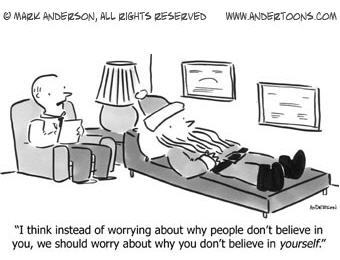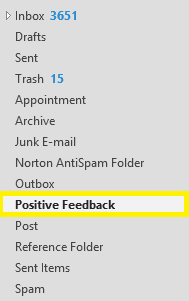Imposter Syndrome and How We Can Overcome It
Me: Tell me about an accomplishment you consider to be the most significant of your career so far.
Woman: [Long pause] Umm, I’m not sure any of my accomplishments have been that significant.
Me: What about the website and marketing plans you built for the financial services client who said your work blew them away?
Woman: Oh, that was okay – it wasn’t really that big a deal.
Me: You seem to consistently downplay your achievements.
Woman: To be honest, I think I’m a fraud … I’m not sure I should be recognized as a marketing expert.
Sound farfetched? I’ve had nearly the identical conversation with many people over the years. And these all very smart, accomplished, driven folks looking to advance their career.
Were they outliers?
Hardly. Research indicates that nearly 70% of the population has considered themselves to be similarly “affected” by what is known as Imposter Syndrome. While initial studies focused on high-performing women, the data transcends gender.
People like Denzel Washington, Tina Fey, Sheryl Sandberg, and Meryl Streep all confess to having suffered from imposter syndrome. Even one of the greatest authors and poets of our time, Maya Angelou, stated that each time she published a new book she thought, “Uh oh, they’re going to find out now.”
Dr. Margaret Chen, former Director-General of the World Health Organization, has many honors, degrees, and accomplishments under her belt. Yet even she stated, “There are an awful lot of people out there who think I’m an expert. How do these people believe this about me? I’m so much more aware of all the things I don’t know.”
And so it is that we easily fall prey to this sense of deceit.
We have two “voices” in our head – one that gently, confidently speaks to our virtues and capabilities assuring us that we belong and that everything is OK. The other voice loudly shrieks in disdain at our faults and mistakes, eager to convince us that we are frauds and not good enough.
It is this second voice we listen to when we choose to be our own worst enemy.
But that need not be.
Curing the Dis-Ease
There are many techniques for conquering the dis-ease of imposter syndrome. The first step is to recognize we are doing this to ourselves. We can’t counteract the effects until we realize we are indeed choosing this “negative” voice.

Anytime we catch ourselves stating we aren’t good enough or feeling like a fraud – that’s the trigger.
Next, step back and look objectively at the assertion. For example, in the case of the woman who told me that none of her accomplishments were that significant – is that really true? By this point in her career, she had built many websites and effective marketing programs for dozens of clients. Is it true that none of them were of significance?
When we can step outside of the situation, ideally without emotion or attachment, we can see things much more clearly. I knew of at least two clients who were very pleased with this woman’s work, gave glowing testimonials, and referred other clients. Thus looking at the data objectively revealed that evidence not only wasn’t there to support her claim of insignificance – in fact, just the opposite was true.
Of course, this is often the case.
And if you find it hard to step-back and look objectively, here’s another technique that can work well: ask a trusted friend or personal advisor whether or not they would agree. It is always easier for an outsider to look with a little less attachment and prejudice.
But I would feel awkward asking someone else about my insecurity.
That’s why we use trusted friends or personal advisors. These are the people who know us well and have our best interests at heart. A simple ask might look like this:
I’m feeling a bit like my web designs don’t count for much and aren’t that significant. I’m not sure if I’m tapping in to a true developmental opportunity where I need to enhance my skills – or if I’m just being my own worst enemy and not seeing things clearly. Can you give me your honest perspective to help me process this emotion?
Those people who know you well will help quickly determine whether the “imposter syndrome” is indeed the cause – or if perhaps there is a skill area that can be further developed and mastered.
Open Yourself to Confidence
Our body chemistry plays a large part in how we feel. Cortisol is a stress hormone that is raised when we are feeling pressured and anxious – and is lower when we are relaxed and poised. Testosterone is a hormone that increases with feelings of power and confidence, and drops when feeling insecure and defensive.
Are there natural ways we can increase testosterone while simultaneously lowering cortisol? Turns out the answer is yes – by “opening” ourselves up.
Research by Amy Cuddy (a former imposter-syndrome sufferer) at Harvard and Princeton demonstrated that by spending two minutes sitting or standing in a pose where our arms are opened up in a “victory” stance can work wonders. Picture having just accomplished an amazing feat and you throw your arms up with a big smile and huge exclamation of “Yes!”
Participants who performed such a “pose” registered dramatically higher levels of testosterone (+20%) and significantly lower levels of cortisol (-25%). In subsequent job interviews, these people were far more likely to receive job offers.
Conversely, participants who spent two minutes in an “imposter” pose fared much worse. An imposter pose has our head hung low, legs and/or arms crossed, defensive, often with our eyes cast downward. These people registered lower levels of testosterone (-10%) and increased levels of cortisol (+15%). In subsequent job interviews, none of these participants received offers.
The data is quite compelling – and that is just spending two minutes either opening up or closing inward. A lesson here: before you engage in a presentation, job interview, or any other activity where you’d like your confidence and strength to shine through – try spending two minutes in such a “victory” pose. And if you’re worried about looking silly, just use a bathroom stall.
The result: you will feel more confident, passionate, enthusiastic, and authentic.
The reason this works is because using such a pose shuts off (or at least greatly diminishes) the “negative” voice telling us we aren’t good enough and that we don’t belong.
Positive Reinforcement Folder
 Negative feedback generally has four-times the impact of a positive comment. In other words, it takes four positive comments to counter-balance the effect of one negative statement.
Negative feedback generally has four-times the impact of a positive comment. In other words, it takes four positive comments to counter-balance the effect of one negative statement.
And if we are the ones making the negative statements then we don’t have to travel very far to hear such criticism.
Of course, we tend to dwell on the negative feedback much more so than the positive. We quickly forget the complimentary, uplifting comments – but carry the disapproving ones quite a long way.
One technique to help counter this phenomenon is to maintain a Positive Feedback folder. Anytime we receive a praising email, phone call, text message, or any other sort of communication – drop a copy in the PF folder.
You’ll be amazed at how quickly this folder grows when we honestly look at the true value of our work. And periodically looking in this folder can quickly eliminate all doubts about whether you belong.
A Cure for the Illness
So, if you really want to push through the imposter-syndrome, consider using the techniques described above, summarized here:
- Recognize we are doing this to ourselves. The trigger is any negative comment, thought, or feeling regarding our abilities.
- Step outside of the situation by asking ourselves, “Am I really looking at this objectively, or am I being my own worst enemy?” If you find it hard doing this yourself, ask a trusted friend or personal advisor how they would view the situation.
- Spend two minutes in a “victory” pose with a big smile on your face.
- Review your Positive Feedback folder.
- Check back in with yourself and confirm you no longer feel like an imposter. How would you rephrase the original “negative assertion”? For example, an original statement of my web designs are just okay … nothing special might be transformed into clients tell me they are very happy with my work … I seem to be making an impact.
Do this anytime you feel the dis-ease beginning to attack.
By using a process like this, we begin to see how often we listen to that “imposter voice” and heed its divisive directives. Like any other skill, with practice comes perfection – and in this case, it doesn’t take much practice to begin reaping the benefits. One honest day of looking, considering objective alternatives, and developing reframed, affirmative declarations will have immense impact.
Everyone has game-changing skills and capabilities within them. The challenge many of us have is articulating those in a way that enables us to best serve others and ourselves. This practice will help.
I have seen so many people transformed from imposter to impressive with this simple exercise. And you can too.
Go confidently in the direction of your dreams!”
Henry David Thoreau
If you liked this article, I go a bit deeper into the imposter syndrome in this podcast episode.